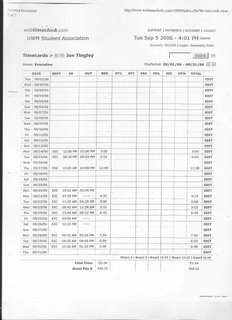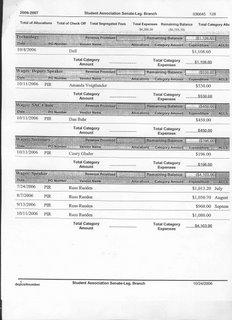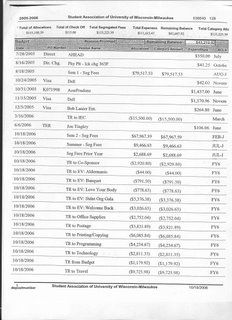November 20, 2006
Dear Provost Cheng,
It has been brought to my attention, via a forwarded email, that the University has established plans to restructure the Division of Student Affairs. The students were never made aware of such endeavors. "As active participants, there must be a meaningful opportunity for input so that student ideas are received and considered before decisions have been made and the meaningful opportunity must include timely notice to students of pending issues concerning immediate governance and policy development of the institutions." Regent Policy 86-4.
It is the position of the students that the University of Wisconsin - Milwaukee Administration is in violation of both the letter and the spirit of Wisconsin Statute 36.09 in regards to the restructuring of the Division of Student Affairs and we request immediate relief from the Office of the Chancellor under Regent Policy 86-4. It is our belief that the Chancellor has vested you, as Provost, with the responsibility to review this matter per [Wisconsin Statue] 36.09(3)(b).
The fundamental thrust of 36.09(5) is to ensure that students are "viable participants in university affairs." Regent Policy 86-4. The most minimal standards of compliance under 36.09(5) and Regent Policy 86-4 have not been met. An elementary reading of the Statutes and Regent Policy affirms this position.
I look forward to working with you to remedy this most troubling situation. Wi will await your reply.
Sincerely,
Samantha R. Prahl
President
UWM Student Association
CC: Chancellor Santiago
Interim Vice Chancellor Hill
Student Association Senate
As this is a draft copy, I have no idea how the final presentation will be laid out. However, I do support the effort being made.
The pull quotes from Regent Policy 86-4 are accurate. The text can be found here, although it begins at Page 85 of that document. This is also the place where it states that any irreconcilable difference in the interpretation of 36.09(5) may be taken to the Board of Regents through the UW-System President.
The reference to Provost Cheng being in charge of this is based on Wisconsin Statute 36.09(3)(b):
The chancellor may designate a person as provost, to act as chief executive officer of the institution in the chancellor's absence, if the person currently holds a limited appointment as vice chancellor, associate chancellor, assistant chancellor, associate vice chancellor or assistant vice chancellor. The chancellor may not create an additional administrative position for the purpose of this paragraph.
As the Chancellor is recovering from surgery at the moment, this qualifies as an absence during which the Provost acts as chief executive officer.
This news is troubling at this time because the University is currently reviewing candidates for Assistant Chancellor for Student Affairs. If this restructuring takes place, it will have been done prior to the new Assistant Chancellor's selection. Also, unless action is taken immediately, it will have been done without the meaningful opportunity for students to have input on this matter.
 Time Log -- Russ Rueden
Time Log -- Russ Rueden Time Log -- Jon Tingley
Time Log -- Jon Tingley Time Log -- Samantha Prahl
Time Log -- Samantha Prahl Summary of Executive branch pay August 2005
Summary of Executive branch pay August 2005 Segregated Fees Summary: Executive Wages
Segregated Fees Summary: Executive Wages Segregated Fees summary: Legislative Wages
Segregated Fees summary: Legislative Wages Segregated Fee Expenditures 2005-2006
Segregated Fee Expenditures 2005-2006